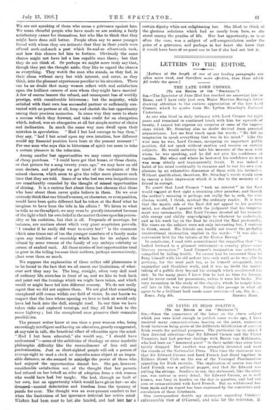LETTERS TO THE EDITOR.
[Letters of the /enoth of one of our lending paragraphs are often more read, and therefore more effective, than those which fill treble the space.]
THE LATE LORD CROMER.
[To THE EDITOR OF THE " Srcor&TOa."] Sia,—The Spectator of June 22nd has reached me somewhat late in Rome, and I have only just seen Major Maurice Baring's letter drawing attention to the curious appreciation of the late Lord Cromer, which he quotes from Mr. Lytton Strachey's Eminent Victorians.
As one who lived in daily intimacy with Lord Cromer for eight years and remained in continued touch with him for upwards of twenty, I cannot but express my surprise at some of the impres- sions which Mr. Strachey also no doubt derived from personal acquaintance. Let me first touch upon the words: "He felt no temptation to speak everything that was in his mind." Like the wise man he was, Lord Cromer, occupying an important public position, did not speak without caution and reserve on certain subjects. He would certainly take his measure of the man with whom he was speaking, and he did not give his confidence at random. But when and where he bestowed his confidence no man was more utterly and transparently frank. It was indeed a habit of his mind continually to examine and to test his own con- clusions by an exhaustive discussion of them with his intimates. Without qualification, therefore, Mr. Strachey's words would seem to convey a false impression which it is due to the memory of a friend to comet.
To assert that Lord Cromer " took no interest" in the East would suggest at first sight a straining after paradox; and though the author's meaning is perhaps not really far to seek, the con- clusion would, I think, mislead the ordinary reader. It is true that the mystic side of the East did not appeal to his positive mind, nor should I quarrel with the judgment that his tempera- ment was unromantic. But Lord Cromer devoted all his remark- able energy and ability ungrudgingly to whatever he undertook, and as his work lay in the East he studied the East profoundly. His views on the subject were not only interesting but, I venture to think, sound. His friends can hardly not resent the probably unintentional insinuation implied in the words : "It was also a convenient field for the talents of Sir Evelyn Baring."
In conclusion, I read with astonishment the suggestion that " lie looked forward to a pleasant retirement—a country place—some literary recreation." Lord Cromer's resignation was reluctant, compelled by failing health. No sooner had he recovered than ho flung himself with his old ardour into such work as he was able to perform, for the most part too, as he himself recognized, into unpopular and thankless work, and it was no doubt the under- taking of a public duty beyond his strength which accelerated his end. In the many years I knew him he had no time for leisure, and he never cared for possessions, unless it were his books. His very recreation in the study of the classics, which he taught him- self late in life, was strenuous. Surely this passage in what all agree to be a brilliant book needs some revision.—I am, Sir, Ac.,


























 Previous page
Previous page